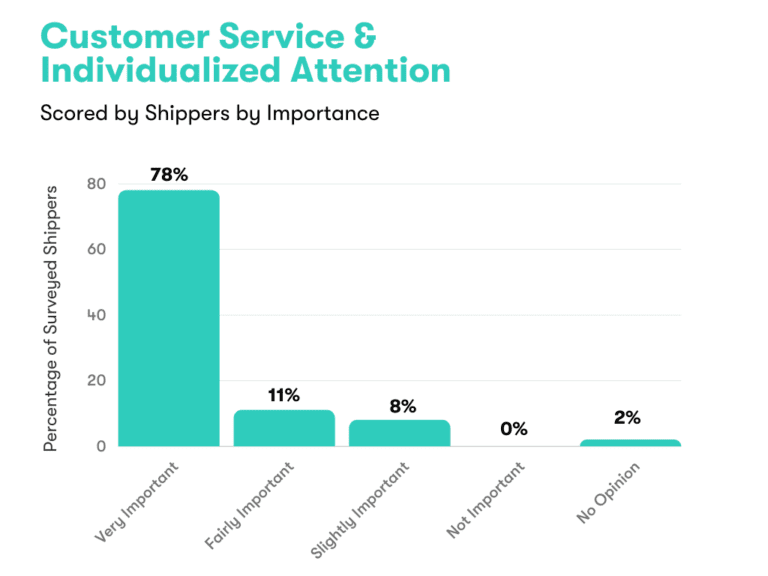In the time following the peak of the pandemic, logistics professionals have learned to brace for shocks and developments, with many maintaining flexibility to pivot at a moment’s notice. However, as we gradually move toward recovery, it’s time to turn our focus to the constant in the freight forwarding industry: relationships.
As competition tightens, maintaining strong connections with your partners is going to be a key differentiator from new forwarders entering the market. Of course, this isn’t news to any seasoned forwarder. But here’s the problem: Even among forwarders who recognize the importance of connection, many neglect the role of technology in building loyalty among shippers and carriers.
Let’s talk about how implementing software can help increase trust, fuel collaboration, and improve results for your shipping partners.
How to strengthen relationships in the logistics industry
In a world of mass-production and AI chatbots, providing a personalized experience can help you stand out to customers. In a survey conducted by FreightWaves and Logixboard, 78% of shippers scored “customer service and individualized attention” as Very Important when working with a freight forwarder.

However, even among forwarders who understand that building relationships in logistics is critical to success, what matters isn’t always intuitive. To invest in relationships that will help move your company forward, you need to understand the top drivers.
Building personal and professional connections
While consistent performance is a major factor in customer satisfaction, it’s hard to build a relationship with someone you never talk to. For that reason, many forwarders make a concerted effort to connect with clients directly to demonstrate their dedication.
For instance, some might send personal messages or book periodic check-ins to make sure they’re meeting their customers’ needs. In these meetings, they’ll review the customer’s individual goals and challenges, as well as how they’re going out of their way to address them. Through intentional interactions like this, you can increase customer loyalty and build a strong reputation in the industry.
Demonstrating openness and honesty
Despite the importance of personal connections, trust is a major consideration when it comes to working with a freight forwarder. Because of the risks and liabilities involved in the freight process, shippers won’t trust just anyone with their orders, no matter how much they like them.
Unfortunately, building trust isn’t easy, and it can feel like a slow process. According to a survey conducted by PwC, the most important drivers of trust for consumers and employees are accountability, clear communications, and admitting to mistakes.
In other words, being transparent about your operations is key to gaining customers’ trust. While it may be tough to acknowledge your mistakes and shortcomings, it’s an important part of demonstrating honesty. After all, every forwarder will fall short at one point or another. What matters is how you own up to it and avoid repeating the problem in the future.
Helping them take it a step further
Being a strong partner means more than just holding up your end of the deal. To stand out among other forwarders, you need to do what you can to elevate your customer’s business.
Treating your business as less of a transaction and more of a partnership can make a big difference in how you work together. By working more collaboratively, you can encourage them to be open about their goals and trust you with more of their needs. From there, you can expand your value to customers by implementing personalized strategies– making your business irreplaceable.
Powering relationships with technology
Regardless of the strategies you use, relationships aren’t formed overnight. However, implementing the right technology can help you get there a lot faster– in a variety of ways.
Enable effective communication
When it comes to facilitating cargo shipments across the globe, communication is key. That’s why many traditional forwarders pride themselves on being accessible and reachable to their shippers. Most of the time, that means being ready to answer their calls at a moment’s notice.
However, providing your customers with personalized attention isn’t the same as being available to talk 24/7. Knowing that your team is on call to respond to requests may put their minds at ease, but it’s not scalable or even necessary. What matters is being available when it counts.
By implementing a tech solution with self-serve features, you can better differentiate between each use case. That way, you can accommodate your customers based on when they need a quick answer vs. when they need your individual attention.
Digital features to enable communication:
- Real-time shipment tracking: Answer the question “Where’s my shipment?”
- Digital document management: Provide shippers with access to associated files
- Online invoicing: Make the payments process streamlined and stress-free
- Centralized messaging: Gives your shippers a single place to exchange and reference messages
With the right tech enhancements, you can empower your shippers to answer their own questions. To start, this will help them feel more in control of their shipment, reducing stress and improving collaboration. At the same time, you can give your team time to address more complicated problems, such as rate negotiation, finding lost cargo, and working out tricky logistics.
Provide visibility into your operations
One effective way to prioritize trust and transparency as a freight forwarder is by giving your customers visibility into their processes. By offering a window into what’s happening on your side, you can assure your customers that you’re being upfront. Not to mention, cutting out the need for ad hoc updates and alerts can save you both time in your day-to-day work.
Digital features to enhance visibility:
- Customer experience dashboard: Enable your customers to view their shipment statuses in one place
- Task status: Give your customers a view of your progress on various tasks (ex: reviewing booking requests, creating quotes, invoicing)
As you leverage tech to consistently provide an up-to-date view of your operations, your customers will feel more at ease in your partnership. In turn, they can pivot their energy spent looking for status updates to more proactive collaboration.
Become a strategic partner
As valuable as it is to work with a forwarder who delivers your cargo reliably, it’s even better to have someone who can help take your business to the next level. When working with shippers, it’s important to remember that this isn’t a zero-sum game. When you help your customers win, it enables them to scale their accounts, increasing revenue for you.
As a forwarder, you’re bringing valuable experience and knowledge to the table. Sharing your insights with customers can provide a major boost to their business. Depending on your clients’ needs, that might mean sending frequent reports, scheduling quarterly business reviews, or updating them on industry developments.
Digital features to level up your shippers’ strategy:
- Real-time analytics dashboard: Provide up-to-date insights based on shipment data (ex: shipment modes, costs, revenue)
- Automated reporting: Streamline report creation and delivery with a customizable template
- Video conference scheduling: Book and record video meetings with customers and prospects
Don’t be mistaken– simply implementing a tech solution won’t automatically give your shippers the insights they need to succeed. Still, leveraging digitized processes can streamline these processes to make them a lot quicker and easier to implement.
Find a digital partner to build and retain your relationships
For many freight forwarders, relationships are the top focus as we continue to move into post-pandemic recovery. With the expanding capabilities of digital solutions in strengthening communication, visibility, and strategic partnership, upgrading your tech stack is becoming a must to compete.
Deliver excellent customer experiences to build relationships and boost revenue. Logixboard integrates with your TMS to elevate your services, without the need to rip and replace. Book a free live demo with our team to see it in action.




